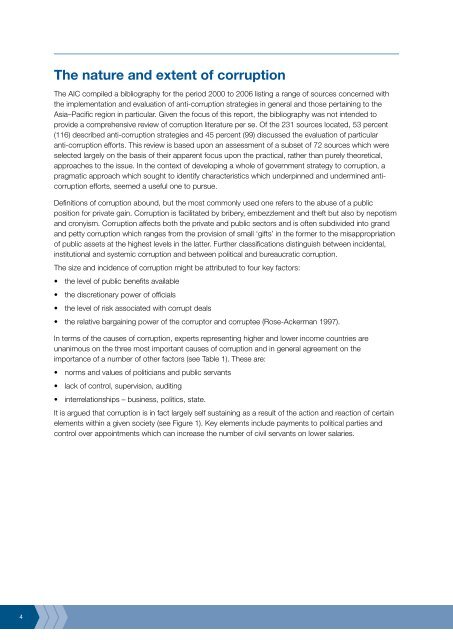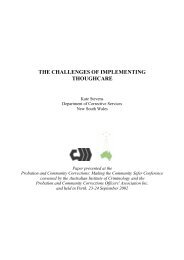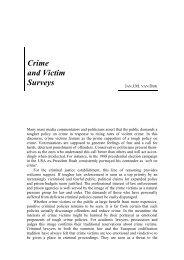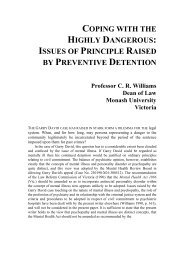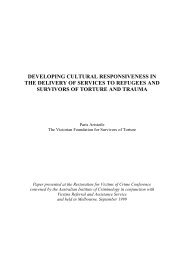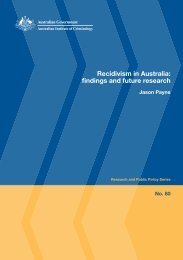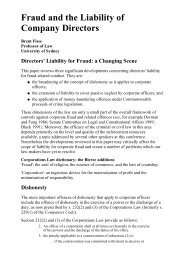Review of anti-corruption strategies Rob McCusker - Australian ...
Review of anti-corruption strategies Rob McCusker - Australian ...
Review of anti-corruption strategies Rob McCusker - Australian ...
You also want an ePaper? Increase the reach of your titles
YUMPU automatically turns print PDFs into web optimized ePapers that Google loves.
The nature and extent <strong>of</strong> <strong>corruption</strong><br />
The AIC compiled a bibliography for the period 2000 to 2006 listing a range <strong>of</strong> sources concerned with<br />
the implementation and evaluation <strong>of</strong> <strong>anti</strong>-<strong>corruption</strong> <strong>strategies</strong> in general and those pertaining to the<br />
Asia–Pacific region in particular. Given the focus <strong>of</strong> this report, the bibliography was not intended to<br />
provide a comprehensive review <strong>of</strong> <strong>corruption</strong> literature per se. Of the 231 sources located, 53 percent<br />
(116) described <strong>anti</strong>-<strong>corruption</strong> <strong>strategies</strong> and 45 percent (99) discussed the evaluation <strong>of</strong> particular<br />
<strong>anti</strong>-<strong>corruption</strong> efforts. This review is based upon an assessment <strong>of</strong> a subset <strong>of</strong> 72 sources which were<br />
selected largely on the basis <strong>of</strong> their apparent focus upon the practical, rather than purely theoretical,<br />
approaches to the issue. In the context <strong>of</strong> developing a whole <strong>of</strong> government strategy to <strong>corruption</strong>, a<br />
pragmatic approach which sought to identify characteristics which underpinned and undermined <strong>anti</strong><strong>corruption</strong><br />
efforts, seemed a useful one to pursue.<br />
Definitions <strong>of</strong> <strong>corruption</strong> abound, but the most commonly used one refers to the abuse <strong>of</strong> a public<br />
position for private gain. Corruption is facilitated by bribery, embezzlement and theft but also by nepotism<br />
and cronyism. Corruption affects both the private and public sectors and is <strong>of</strong>ten subdivided into grand<br />
and petty <strong>corruption</strong> which ranges from the provision <strong>of</strong> small ‘gifts’ in the former to the misappropriation<br />
<strong>of</strong> public assets at the highest levels in the latter. Further classifications distinguish between incidental,<br />
institutional and systemic <strong>corruption</strong> and between political and bureaucratic <strong>corruption</strong>.<br />
The size and incidence <strong>of</strong> <strong>corruption</strong> might be attributed to four key factors:<br />
•<br />
•<br />
•<br />
•<br />
the level <strong>of</strong> public benefits available<br />
the discretionary power <strong>of</strong> <strong>of</strong>ficials<br />
the level <strong>of</strong> risk associated with corrupt deals<br />
the relative bargaining power <strong>of</strong> the corruptor and corruptee (Rose-Ackerman 1997).<br />
In terms <strong>of</strong> the causes <strong>of</strong> <strong>corruption</strong>, experts representing higher and lower income countries are<br />
unanimous on the three most important causes <strong>of</strong> <strong>corruption</strong> and in general agreement on the<br />
importance <strong>of</strong> a number <strong>of</strong> other factors (see Table 1). These are:<br />
•<br />
•<br />
•<br />
norms and values <strong>of</strong> politicians and public servants<br />
lack <strong>of</strong> control, supervision, auditing<br />
interrelationships – business, politics, state.<br />
It is argued that <strong>corruption</strong> is in fact largely self sustaining as a result <strong>of</strong> the action and reaction <strong>of</strong> certain<br />
elements within a given society (see Figure 1). Key elements include payments to political parties and<br />
control over appointments which can increase the number <strong>of</strong> civil servants on lower salaries.


